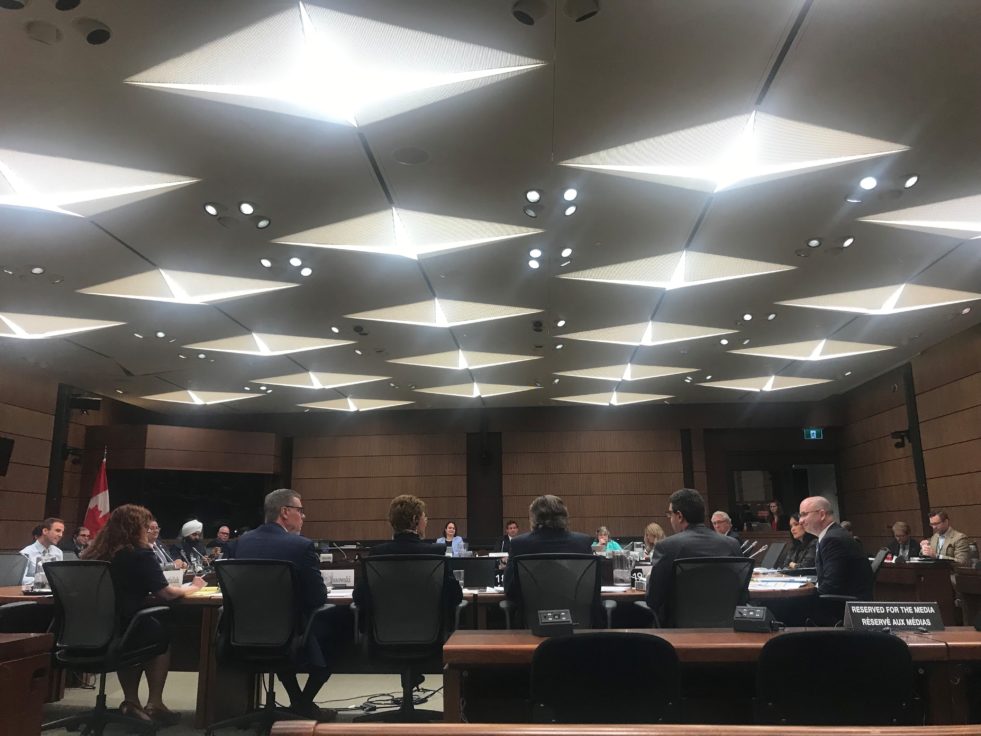
Standing Committee on Citizenship and Immigration studying the Budget Implementation Act and the proposed changes to Canada’s asylum system. ©UNHCR/ Azadeh Tamjeedi
Statement made by Jean-Nicolas Beuze, the UNHCR Representative in Canada:
Thank you for the opportunity to appear before the Standing Committee on Citizenship and Immigration regarding the proposed changes to Canada’s asylum system as outlined in the Budget Implementation Act (BIA). Providing technical advice to increase efficiencies in asylum systems is an integral part of UNHCR’s advisory role worldwide, and we support any measures that ensure prompt decision-making while upholding the essential elements of a fair asylum system.
While the number of asylum-seekers arriving in Canada increased over the last two years, I have previously noted before this Committee that measures taken have maintained access to asylum in a humane and efficient manner with adequate security checks. UNHCR recognizes that governments, including Canada, must strike a balance between managing migration flows, ensuring border security, and maintaining public confidence in asylum and immigration systems. In doing so, they must abide by their international obligation to grant refuge to those at risk of persecution. In this context, mixed flows and onward movements of people from countries like the U.S. may be perceived, by the general public, as a misuse of asylum. It is therefore legitimate for governments to take measures to address such concerns, and find ways to triage cases to ensure a fair, efficient and robust process in a timely manner.
UNHCR welcomes important investments to Canada’s asylum system in the 2019 Budget. They build on increased efficiencies gained over the last two years. The recent proposed legislative changes that we are discussing today, form part of a broader strategy. They include a significant increase in funding to the police, border agency, legal aid and the Immigration and Refugee Board (IRB). They seek to increase cost-effective efficiencies at the front end of the asylum process. Investments in refugee healthcare and housing will also benefit refugees and asylum-seekers.
Under the proposed changes, individuals who have made an asylum claim in countries that have a data sharing agreement with Canada would be barred from having their case heard before the IRB. However, they will not be barred from claiming asylum in Canada or from being recognised as refugees. Indeed, they will be channelled through the Pre-Removal Risk Assessment (PRRA).
The PRRA has the same protection objectives as the refugee determination process at the IRB. It is based on the same grounds and confers the same degree of refugee protection. In other words, the same definition will be applied to assess whether someone is in need of protection in Canada because of risks they may face in their country of origin.
I would like to take a moment to discuss a concern often heard recently. It is true that the PRRA has an acceptance rate of seven per cent when it provides a last recourse measure, after negative decisions by the IRB and the Federal Court. This low acceptance rate suggests that the IRB and Courts are performing their mandate in an effective manner. However, the acceptance rate goes up to approximately 30% when it is a first-instance mechanism. It must be noted that based on the last two years’ data, some three per cent of claimants will be channelled to the PRRA as a first-instance mechanism. Any discussions around acceptance rates should however be taken with a grain of salt. What ultimately matters is that no individual is forcibly returned to a country where he or she will be at risk of torture or persecution. And every case is to be assessed against its own merits.
Protection safeguards built into the PRRA process must now be fully utilized and all stakeholders have a responsibility to make sure that they are used to ensure a fair PRRA process. Under the enhanced PRRA referred to by the government, UNHCR has received assurances from the government that no one would be removed without due process, which notably includes the right to a hearing prior to removal. This in line with Canadian and international jurisprudence. Asylum-seekers falling into this new stream will need to continue having access to information about the PRRA process, effective language interpretation and access to counsel. Similarly, PRRA officers will have to be trained further specifically on how to conduct individual hearings in a fair and efficient manner, including by ensuring that counsels play their role fully through interventions during the course of the hearing.
In the past, UNHCR has also advocated for the reduction of procedural steps throughout the front end case process that cause delays and increase costs. Our recommendations included exceptions for people coming from moratorium countries to be given a protected person status given they cannot be returned home and automatic stays of removal during appeals of negative asylum decisions. UNHCR is looking forward to lessons learned from the various pilots that relate to inter-institutional coordination on case processing, simplification of data collection and forms, triaging and streamlining. In addition, timely removal of those not in need of international protection after all available remedies have been exhausted and due process completed will continue to be key to guarantee an asylum system that is fair and efficient, and thus maintain the public’s confidence.
UNHCR has long supported the IRB and its independence as a model, and continues to do so. Finding ways to increase efficiencies through better triaging while upholding access to fair procedures are however legitimate. In discussing these complex realities, often of a technical nature, we all have a responsibility and must work together to ensure that the conversation about asylum and refugees remains objective and balanced, based on sound legal analysis and facts. Asylum systems must at times be flexible to address changes in the patterns and profiles of asylum-seekers to remain fair, cost-effective and efficient, thus ensuring public confidence in its integrity.
Thank you.





